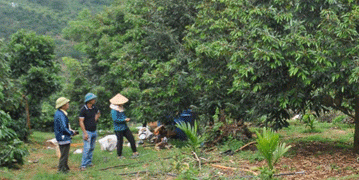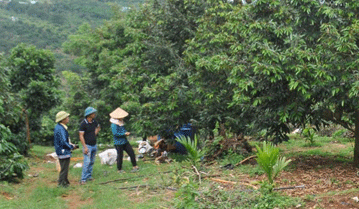In Đắk Nông province, agricultural production is getting a major boost through collaborative efforts that align the interests of farmers, businesses, and government authorities. The province, with over 380,000 hectares of agricultural land, relies heavily on crop farming, which makes up the bulk of its agricultural production value. In recent years, the agricultural sector has shifted towards a “3-house” partnership model—linking farmers, businesses, and government efforts to improve the quality and marketability of local crops.
One recent example of this model in action is the VietGAP-compliant cabbage production project launched in May 2024 in Thuận Hạnh Commune, Đắk Song District. This project spans 6 hectares and involves 12 participating households. By linking these farmers with Nam Nung High-Tech Agriculture Joint Stock Company, the program guarantees a stable market for their produce at a set price of 5,000 VND per kilogram, ensuring profitability and reducing financial uncertainty for the participants.
Increased Profit and Market Security
For farmers like Mrs. Trần Thị Ngoan, who grows cabbage on a 1-hectare plot, the benefits of joining this linked production chain are clear. Mrs. Ngoan shared that her family harvested 80 tons of cabbage this season, earning approximately 300 million VND in profit after costs. In comparison, cabbage grown outside of this structured supply chain sells for just 2,000 to 3,000 VND per kilogram, making traditional farming methods riskier and less profitable.
The agricultural linkages also provide farmers with access to government subsidies for up to 70% of agricultural input costs, ensuring they have the necessary resources to meet quality standards. Nam Nung High-Tech Agriculture Joint Stock Company not only buys the crops but also helps farmers implement best practices to improve their yields and meet market demands.
Strengthening the Value Chain in Đắk Nông
While cabbage and carrots are the primary focus in areas like Thuận Hạnh and Đắk Ha, Đắk Nông’s production chain partnerships extend beyond vegetables. The province is working to connect local farmers with processors, exporters, and specialty markets through cooperatives and small- and medium-sized enterprises. These partnerships help raise the quality and marketability of Đắk Nông’s key agricultural products.
The province’s agricultural leadership, such as Nguyễn Văn Chương, Director of the Đắk Nông Center for Agricultural Extension, views the production chain model as the foundation for rural development. By providing clear market access through cooperatives and stable price agreements with businesses, the system empowers farmers to focus on producing high-quality crops that meet market demands.
Reducing Risk Through Partnership
As Phạm Tuấn Anh, Director of Đắk Nông’s Department of Agriculture and Rural Development (DARD), explained, the main strength of these linkages lies in their ability to provide farmers with predictable incomes and market conditions. “From the moment they plant their crops, farmers know exactly what they can expect to earn,” he said. This level of certainty contrasts sharply with traditional farming, where farmers often face volatile markets and uncertain buyers.
Additionally, Tuấn Anh emphasized the importance of shared responsibility between all parties involved. The success of these partnerships depends on clear quality standards, accountability, and long-term cooperation. By forming strong links between producers, businesses, and government, Đắk Nông is building a more resilient agricultural sector capable of weathering the risks associated with fluctuating prices and unstable markets.
Đắk Nông’s innovative approach to agricultural partnerships is creating a win-win situation for both farmers and businesses. By integrating farmers into well-structured production chains, the province ensures stable income, market access, and improved crop quality. This collaborative model not only benefits individual farmers like Mrs. Ngoan but also strengthens the entire agricultural ecosystem in the region. As the production chain model expands, Đắk Nông is setting a precedent for other regions seeking to modernize their agricultural sectors while ensuring profitability and sustainability for all stakeholders.































